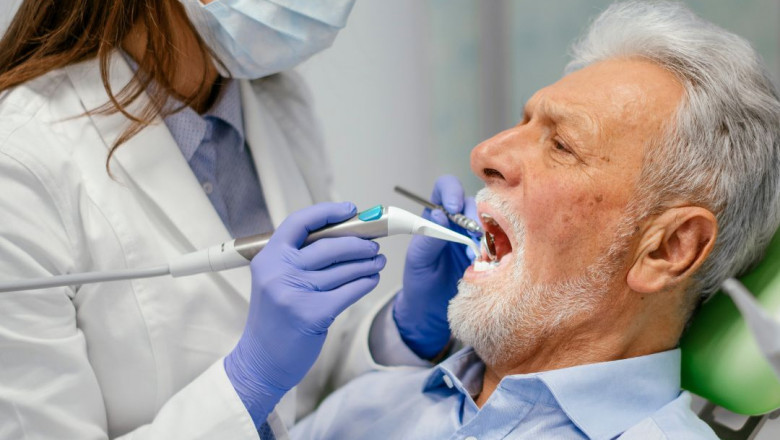views
Understanding Tooth Pain: Causes, Symptoms, and Treatments
Tooth pain, also known as dental pain or toothache, is a common but often debilitating issue that can affect anyone at any stage of life. While the severity can range from mild discomfort to unbearable throbbing, tooth pain is usually a sign that something is wrong and requires attention. Whether it stems from decay, infection, or injury, understanding the root causes and available treatments is essential for maintaining good oral health. Let’s explore what causes tooth pain, the symptoms to look out for, and the most effective treatment options available.
Common Causes of Tooth Pain
There are numerous reasons why someone might experience tooth pain, ranging from minor irritation to serious dental issues. Some of the most common causes include:
1. Tooth Decay
Tooth decay is one of the leading causes of tooth pain. It occurs when bacteria in the mouth produce acids that erode the tooth enamel, eventually reaching the inner layers and causing inflammation and sensitivity.
2. Gum Disease
Gum disease, or periodontal disease, is an infection of the tissues that support the teeth. Early-stage gum disease (gingivitis) may cause mild pain and bleeding, while advanced stages (periodontitis) can lead to severe pain and tooth loss.
3. Dental Abscess
A dental abscess is a pocket of pus caused by a bacterial infection. It often results in intense pain, swelling, fever, and even a bad taste in the mouth. Abscesses require immediate attention from a dental professional.
4. Tooth Fractures or Cracks
A cracked or fractured tooth may not always be visible, but it can cause pain when chewing or when the tooth is exposed to temperature changes. Left untreated, it can lead to infection or nerve damage.
5. Impacted Wisdom Teeth
Wisdom teeth that do not erupt properly can become impacted, leading to pain, swelling, and even crowding of other teeth. Removal is often necessary to prevent complications.
6. Bruxism (Teeth Grinding)
Grinding or clenching teeth, especially during sleep, can wear down enamel and put stress on the jaw and surrounding muscles, leading to pain and discomfort.
Recognising the Symptoms
Tooth pain can manifest in a variety of ways, depending on the underlying cause. Some of the key symptoms include:
- Sharp or throbbing pain in or around a tooth
- Sensitivity to hot, cold, or sweet foods and drinks
- Swelling of the gums or face
- Red, inflamed, or bleeding gums
- Pain when biting or chewing
- Foul taste or odour from the mouth
- Fever or general feeling of being unwell (in the case of infection)
Paying close attention to these symptoms is crucial. The earlier you identify a dental issue, the more likely it can be treated effectively without invasive procedures.
When to See a Dentist
It’s important not to ignore tooth pain, especially if it persists for more than a day or two. Visiting a dentist in Mt Druitt at the earliest signs of trouble can help prevent further complications. Delaying treatment may lead to more serious conditions, including infections that spread beyond the mouth.
Whether it's a minor cavity or a more severe issue like an abscess, seeking professional advice is always the best course of action. A local dentist Mt Druitt is well-equipped to diagnose the problem accurately and recommend the appropriate treatment.
Treatment Options
The treatment for tooth pain depends entirely on its cause. Common treatment options include:
- Fillings: For minor cavities, fillings can restore the tooth and prevent further decay.
- Root Canal Therapy: If the tooth’s nerve is infected or damaged, a root canal may be required to remove the pulp and save the tooth.
- Tooth Extraction: In severe cases where the tooth cannot be saved, removal may be necessary.
- Antibiotics: If there’s an infection, antibiotics may be prescribed to clear it up before or after treatment.
- Desensitising Treatments: For teeth that are overly sensitive, special treatments or toothpastes can help reduce discomfort.
The Role of Preventive Dentistry
While treatments are essential when problems arise, preventive dentistry plays a crucial role in avoiding tooth pain in the first place. Preventive dentistry focuses on maintaining oral health through regular check-ups, cleanings, fluoride treatments, and patient education.
Good oral hygiene habits such as brushing twice a day, flossing daily, limiting sugary foods, and visiting the dentist regularly can significantly reduce the risk of developing tooth pain. Prevention is always better than cure, and engaging in preventive care is a cost-effective and pain-free way to protect your smile.
In Mt Druitt and surrounding areas, many dental practices specialise in preventive dentistry, ensuring the local community has access to top-quality care that keeps tooth problems at bay.
In summary, tooth pain is more than just a minor inconvenience—it can be a signal of serious underlying dental issues. Understanding the causes, recognising the symptoms early, and seeking timely treatment are essential steps towards maintaining a healthy mouth. Whether it's through restorative procedures or proactive preventive measures, caring for your teeth is vital to your overall well-being. If you’re experiencing tooth pain or simply want to stay ahead of potential issues, booking a consultation with a trusted dentist Mt Druitt could be your best next step. Embrace preventive dentistry today, and protect your teeth for a lifetime of confident smiles.
Your Healthy Smile Dentists
154 Bennett Rd,
St Clair NSW 2759,
Australia
612 9670 6991














Comments
0 comment